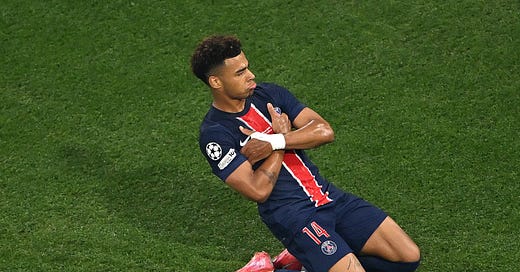PSG's win in the CL: refreshing, but symptomatic of a competitive demise
There are positives we can take from Saturday's victory, not least a new winning team with youth and exuberance. But glory for anyone but a super club is now unthinkable.
Paris Saint-Germain’s win in Saturday’s Champions League final was simultaneously refreshing but indicative of how the upper echelons of club football are dominated by extraordinarily wealthy “super clubs”, and increasingly will be.
This is the ongoing demise of competitive balance in action.
On the refreshing side of the ledger, PSG won the CL for the first time, and under a manager, Luis Enrique, who is both a brilliant coach and a charismatic leader with a powerful back story.
They recorded an all-time winning margin of five goals in their 5-0 trouncing of Internazionale, and did this in a season when, for the first time in seven years, they had the services of none of their recent superstar triumvirate of Kylian Mbappé, Lionel Messi and Neymar.
A more modest, and youthful, group of players achieved this, with cohesion, led on Saturday by an outstanding performance from Désiré Doué (below).
Also on the positive side, PSG fielded the youngest starting XI in a Champions League final in the 21st century, with an average age of 25 years and 96 days. In stark contrast, Inter’s starting XI averaged 30 years and 242 days, thereby creating the biggest ever age gap between two starting line-ups in a Champions League final.
There are other positives going forward, which we will get to shortly, but on the flip side of the good news, PSG’s win was really just an inevitable end point after 14 years of ownership by a Middle East petro-state with a dubious human rights record, a controversial PSG president, and an elastic view of the extent to which they should follow financial rules.
PSG have spent more than £2bn on transfers since QSI’s investment began in 2011, and, in 2014, just like Manchester City, they were found guilty and punished for failing UEFA’s Financial Fair Play rules after egregious financial doping.
Having benefited from the kind of leg-up that only a tiny number of clubs have ever had - thanks to oil-rich billionaire benefactors - PSG are now as ensconced in the super rich brigade every bit as much as Barcelona and Real Madrid, Manchester United, and City and Chelsea, Bayern Munich, Juventus and perhaps a handful of others.
They will have earned considerably north of €100m for winning this season’s Champions League, and probably closer to €150m. They will play in the inaugural 32-team FIFA Club World Cup this summer, where another tournament win would bring them another huge payout, detailed later.
The Champions League is, these days, already pretty much the Super League that 12 of Europe’s greediest clubs aborted so rapidly in 2021 due to fan protests. And it should be noted that PSG were not among those 12, and nor were Bayern; the dozen comprised six English clubs, three from Spain and three from Italy.
Today’s piece will reveal in greater detail:
The extent to which the already rich are getting richer, building squads that in multiple cases have cost more than €1bn to assemble in transfer fees.
How 50% of all participants in the Champions League over the past decade have come from just four of UEFA’s 55 constituent countries; and how that rises to 65% from just six nations.
How PSG’s wage bill became the biggest in the history of world football, so on the basis that wage spend generally equates to success in elite European football, PSG have been slow to reach the summit.
How, having bagged the Champions League, they will now move on to the Club World Cup, where I reveal below what every participating club will earn, depending on whether they crash out in the group stages or win the final.
Also how PSG’s squad now looks primed for a tilt at repeated elite continental titles, detailing every current player’s age and contract length, which highlights how their long-timing planning is finally coming good.





